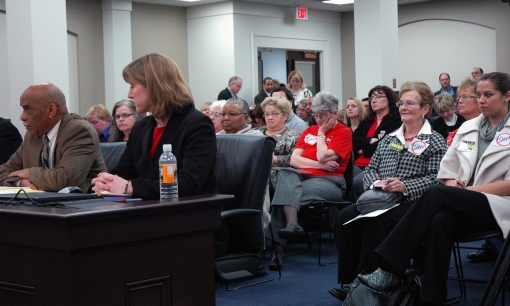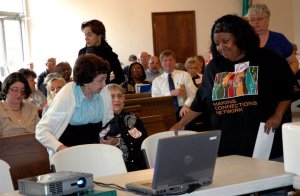Testimony before the Kentucky Consumers’ Advisory Council
Testimony submitted and presented by: Brigitte Blom Ramsey, Kentucky Youth Advocates
Data prepared by: Melissa Fry Konty, Ph.D.,Research and Policy Associate, MACED
Good Afternoon:
Thank you all for being here and for taking the time to hear from a range of voices about the impacts of payday lending on Kentucky’s hardworking families. My name is Brigitte Ramsey. I live in Northern Kentucky and work for Kentucky Youth Advocates. Kentucky Youth Advocates is a statewide nonprofit organization working to increase the well-being of children and families in the Commonwealth. We are part of the Kentucky Coalition for Responsible Lending because we see how payday loans can devastate the financial security of Kentucky households.
In February, the Coalition released a report entitled, “The Debt Trap in the Commonwealth: The Impact of Payday Lending on Kentucky Counties,” which you should have already received as part of your packets. Our research is based on 2008 data from the Department of Financial Institutions and uses models constructed by the Center for Responsible Lending in North Carolina based on data from databases, much like our new one, in 19 other states. In the couple of minutes that I have, I will highlight the findings from our study, and briefly address preliminary findings from current data generated by Kentucky’s new payday lending database, with particular attention to Northern Kentucky counties.
In 2008, 95 of Kentucky’s 120 counties were home to 781 payday lenders. To put this in perspective, there are approximately 250 McDonald’s in the state. Kentuckians paid upwards of 400 percent interest on nearly 3 million loans, totaling approximately $158 million in predatory loan fees – in one year.
When we say “predatory fees” we refer to the fees paid by borrowers who take out five or more loans in a year: those borrowers are stuck in a debt trap. The fees associated with these repeat loans are considered predatory, because they are collected as the result of a business model built on people’s inability to repay a loan with such a short term. According to the Commonwealth’s new database, 83 percent of Kentucky’s payday loans from May thru September went to consumers who took out 5 or more loans during that 5 month period.
Northern Kentucky is not immune from the ills caused by the harmful payday product. There are currently 49 payday lending establishments scattered across six of the eight counties that make up the northern Kentucky region. Combined these lenders have charged more than $7.4 million in fees in the first nine months of 2010.[1] This represents a loss of scarce resources for families and individuals who are already struggling to make ends meet.
(Verbally – Here you can see the counties where payday lenders are in operation. You can see that Kenton County is home to the largest number of payday lenders in the northern Kentucky region with 17 operations where borrowers paid nearly $2.4 million in fees – again representing a drain of resources families need to be self-sufficient and make ends meet.)
Northern Kentucky Counties
| Licensee County |
Deferred Deposit Licenses as of October 2010 |
Total All Transactions |
Estimated Loan Volume Based on Average Loan Size |
Estimated Total Fees (based on average fees per transaction) |
| Boone |
13 |
$ 38,439 |
$ 11,949,006 |
$ 1,968,030 |
| Campbell |
12 |
$ 36,581 |
$ 11,371,435 |
$ 1,872,903 |
| Kenton |
17 |
$ 46,411 |
$ 14,427,152 |
$ 2,376,187 |
| Carroll |
3 |
$ 9,557 |
$ 2,970,854 |
$ 489,307 |
| Grant |
3 |
$ 13,550 |
$ 4,212,103 |
$ 693,743 |
| Pendleton |
1 |
$ 1,400 |
$ 435,199 |
$ 71,678 |
| Total |
49 |
$ 145,938 |
$ 45,365,749 |
$ 7,471,848 |
This is not simply a problem for urban families. (As you can see Carroll, Grant, and Pendleton – rural counties in northern Kentucky all have payday lenders. Carroll and Grant each have three and borrowers paid nearly $500,000 – $700,000 in fees.) We found the highest concentration of payday lenders in rural Mason County, (adjacent to northern Kentucky, and) home to roughly 17,000 people. Today, Mason County has nine payday lenders in operation and the highest per capita debt load in the Commonwealth. (Per capita debt load is defined as the amount of loans and fees if spread across the adult and child population in the geography.)
Select Eastern Kentucky Counties
| Licensee County |
Deferred Deposit Licenses as of October 2010 |
Total All Transactions |
Estimated Loan Volume Based on Average Loan Size |
Estimated Total Fees (based on average fees per transaction) |
| Boyd |
18 |
40,341 |
$12,540,254 |
$2,065,410 |
| Floyd |
6 |
13,344 |
$4,148,067 |
$683,197 |
| Perry |
9 |
19,230 |
$5,977,767 |
$984,553 |
| Whitely |
12 |
24,108 |
$7,494,124 |
$1,234,300 |
| Total |
45 |
97,023 |
$30,160,212 |
$4,967,459 |
A large portion of the money paid in fees to payday lenders leaves our communities. The majority of payday lenders in Kentucky are nationally owned and their profits leave the state. As shown, payday lending has contributed to a wealth drain of nearly $7.4 million in northern Kentucky counties alone in 2010.
Payday lenders locate in low- to moderate-income neighborhoods where people are most likely to need access to small-dollar credit—but the families in these neighborhoods are also least likely to be able to repay the loans within the two-week term while still meeting their financial obligations – creating a cycle of need that leads to a debt trap – (and a threat to a families financial stability).
Payday loans threaten the economic security of Kentucky’s families – particularly single mothers with children. The payday lending industry’s own research shows that 60 percent of borrower’s are women; 49 percent of payday borrowers have a dependent child; and that borrowers are less likely to be married compared to the national average.[2]
Since 2008, the number of payday lenders in the state of Kentucky has declined from 781 to 667, but this is still 2 and half times more than the number of McDonalds in our state. Some might argue that the database is responsible for this decline. Rather, we submit that the moratorium on new licenses is responsible for the slowed growth as no new licenses could be issued this year. Further, continued job loss and broad economic decline both associated with the national recession are likely responsible for the closure of some stores. Finally, the database likely made business less profitable for some lenders, causing them to close their doors. However, the data show that those still in business continue to trap borrowers in the debt cycle produced by a product with high fees and a short repayment period.]
In the first nine months of 2010, payday lenders made nearly 1.6 million loans totaling more than $486 million in paycheck advances and more than $80 million in fees.[3] These 1.6 million loans went to 182,159 people – an average 8.6 loans per borrower. As previously stated, 83 percent of payday revenue in the first five months of the database came from borrowers with five or more loans.
These figures demonstrate that the debt trap continues in Kentucky, and illustrates a direct contradiction to the claim that the payday loan industry business model is to provide quick loans for short-term use only. Rather, these numbers confirm that borrowers find themselves stuck in a chronic situation resulting from high borrowing fees that drain families’ resources and a short repayment period that does not allow a families budget to recover before the loan must be repaid. The data from the new database clearly shows that the industry derives the bulk of their revenue from borrowers stuck in this cycle of debt.
The database indicates a low 2.25 percent default rate. This may lead some to conclude that we do not have a problem. However, the structure of these loans means that borrowers pay them back on time straight out of their paycheck on payday. This tells us nothing about how many of them follow up their repayment with a new loan as soon as possible. Again, the ratio of number of loans to number of borrowers is indicative of the repeat borrowing debt trap that hardworking families in the Commonwealth continue to experience, even with the database in place.
In May of 2010, 51.5 percent of requests for payday loan transactions were declined. By September the decline rate had dropped to 8.8 percent. Declines resulting from the implementation of the database would be those loans requested by people with two or more loans already out. While some may say the reduction in the decline rate suggests improvements as fewer people appear to be trying to take out more than two loans at a time, this misses the point. Reducing the number of borrowers that have more than two loans out at a time reduces the risk to the lender, but it does not significantly reduce the risk to borrowers. Borrowers are still able to carry two loans at a time, which carry the same 400% interest rates just like they always have. Thus, borrowers are unable to pay them off and still meet all of their obligations, and open new loans as soon as they pay off prior loans. As previously stated, the ratio of total loans to number of borrowers clearly reflects this pattern with an average 8.6 loans per customer in 2010.
(During the first months the database was operational – ) borrowers across Kentucky paid an estimated $35.7 million in fees from May to September of this year. During the same 5 month period, just 2.5 percent of payday lending revenue was generated by customers who took out only one loan.
Though the database provides useful information, it has not curbed the debt trap (nor has it protected financially vulnerable families from predatory practices). Only a return to a 36% rate cap can spring Kentuckians from the payday lending debt trap.
[1] These estimates are likely to be low. The Department of Financial Institutions indicated that not all lenders provided data for January through April. We can only be sure we have full data from May 2010 thru September 2010.
[2] Payday Advance Customer Satisfaction Survey conducted by the Cypress Research Group, 2004.
[3] These estimates are likely to be low. The Department of Financial Institutions indicated that not all lenders provided data for January through April. We can only be sure we have full data from May 2010 thru September 2010.


